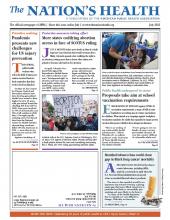
For more, visit the Center for Music & Medicine at bit.ly/musicandhealth
Be it pop, classical, rap, country or old-time rock ‘n’ roll, there’s probably some kind of music that just soothes your soul. And for good reason. Whatever your jam, a lot of studies show that music can improve your emotional and physical health and well-being.
Research shows that listening to or making music can help chase away the blues, alleviate anxiety and pain, lower your blood pressure and improve your mental alertness and memory.
By definition, music is simply a pattern of sounds made by instruments, voices or electronics. Yet music is so much more than that. It’s hard to imagine what our lives would be like without music.
Like a faithful companion, music travels beside us throughout our lives, ready and willing to energize, calm, delight, comfort, inspire and soothe us. Has a particular tune ever moved you to the point that you felt goose bumps? Studies show that about half of us experience pleasurable chills when listening to a tune.
Music’s powerful affect on human emotions has long intrigued researchers. They understand the brain mechanisms that support music’s healing powers, but have yet to agree on exactly why music can evoke such powerful healing emotions.
“It makes no sense why a pattern of sounds organized in a particular way gives us goose bumps and cheers us — we just don’t understand,” says Pablo Ripollés, PhD, MS, an assistant professor of psychology at New York University. “But what we do know is that music is an incredibly powerful stimulus that activates multiple brain regions at the same time, and that we can harness it to our benefit.”
Listening to music creates what scientists call “an enriched environment,” in which nearly every region of the brain is lit up simultaneously, helping it to make new connections.
As associate director of NYU’s Music and Auditory Laboratory, Ripollés has participated in studies with stroke patients that show listening to music can promote healing by stimulating structural changes in the areas of the brain responsible for verbal memory, language skills and focus. Research shows mice with brain injuries heal faster when their environment is enriched with music.
What’s on your playlist?
Everyone can reap music’s health benefits. In addition to a healthy diet, exercise, sufficient sleep and regular checkups, science shows that listening to music for just an hour a day can make you feel better.
The key is to listen to music you really like. If you enjoy classical, listen to classical. If you’re into heavy metal, go right ahead. Everyone’s taste in music is different. In fact, even within the same culture, there are huge individual differences in the types of music people find pleasurable, says Ripollés, who confesses that his go-to jam is bagpipes.
“Bagpipe music makes me super emotional and teary,” he says. “I don’t know anybody that loves bagpipes as much as I do. Some people find it super annoying.”
The bottom line is that there is no type of music that will benefit you more or less than any other.
“Listen to the things that really make you want to dance, or that make you emotional and that maybe bring memories from happy moments in your life,” Ripollés says. “This is all about stimulating your brain.”
Make your own kind of music
Regularly engaging with music — whether listening, playing an instrument or singing — can help you relax and feel better. And you don’t have to be an accomplished violinist or an American Idol finalist to reap these rewards. Research shows that learning even a simple instrument like the ukulele or pecking out “Happy Birthday” on a keyboard can sharpen your mind, lower your blood pressure and improve your mood, among a host of other benefits.
Even if you can’t carry a tune, singing can improve your health. The deep-breathing techniques used for singing can also exercise your lungs, improve oxygen levels in the brain and stimulate circulation. For that reason, research shows singing might be beneficial for certain lung and breathing conditions.
Some studies suggest that the muscles associated with singing can potentially reduce snoring. Singing has also been found to release hormones associated with feelings of pleasure and relaxation. Recognizing the benefits singing can have on memory recollection, the Alzheimer’s Society offers a singing program for people with dementia.
Too shy to sing in public? Step into the shower and belt out a song. It can soothe your nerves, raise your spirits, get your blood going and might be better for you than that morning Frappuccino.
- Copyright The Nation’s Health, American Public Health Association









